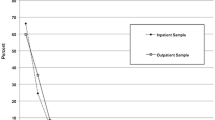Abstract
This article uses service utilization and outcome data from the specialized posttraumatic stress disorder outpatient programs of the Department of Veterans Affairs to illustrate a method of evaluating the required intensity of outpatient psychiatric treatment. The analyses presented suggest that posttraumatic stress disorder treatment programs could offer intensive services for only the first four months of treatment, followed by a reduction in intensity to an average of only one visit per month, without loss of clinical gains. Workload projections suggest that applying such standards under a system of regulatory control would allow a 17%–51% increase in patients treated.
Similar content being viewed by others
References
Berenson, R.A. (1991). Commentary: A physician's view of managed care.Health Affairs 10, 106–119.
Derogatis, L.R., & Melisaratos, N. (1983). The brief symptom inventory: An introductory report.Psychological Medicine 13, 595–605.
Fontana, A., Rosenheck, R., & Spencer, H. (1993).The long journey home III: The third progress report on the specialized PTSD programs. West Haven, CT: VA Northeast Program Evaluation Center.
Gray, B.H. (1991).The profit motive and patient care: The changing accountability of doctors and hospitals. Cambridge, MA: Harvard University Press.
Gray, B.H., & Field, M.J. (1989).Controlling costs and changing patient care? The role of utilization management. Washington, DC: Academy Press.
Gurman, A.S., & Kniskern, D.P. (1978). Research on marital and family therapy: Progress, perspective, and prospect. In S.L. Garfield & A.E. Bergin (Eds.),Handbook of psychotherapy and behavior change: An empirical analysis (2nd ed.). New York: Wiley.
Katz, M.M., & Lyerly, S.B. (1963). Methods for measuring adjustment and social behavior in the community: I. Rationale, description, discriminative validity and scale development.Psychological Reports, 13, 505–535.
Keane, T.M., Caddell, J.M., & Taylor, K.L. (1988). Mississippi scale for combat-related post-traumatic stress disorder: Three studies in reliability and validity.Journal of Consulting and Clinical Psychology, 56, 85–90.
Kulka, R.A., Schlenger, W.E., Fairbank, J.A., Hough, R.L., Jordan, B.K., Marmar, C.R., & Weiss, D.A. (1990).Trauma and the Vietnam War generation: Report of findings from the National Vietnam Veterans Readjustment Study. New York: Brunner/Mazel.
Laufer, R.S., & Frey-Wouters, E. (1988, October). War trauma and the role of guilt in post-war adaptation. Paper presented at the annual meeting of the Society for Traumatic Stress Studies, Dallas, Texas.
Laufer, R.S., Yager, T., Frey-Wouters, E., & Donnellan, J. (1981).Legacies of Vietnam (Vol. III), Post-war trauma: Social and psychological problems of Vietnam veterans and their peers. Washington, DC: U.S. Government Printing Office.
Luborsky, L., Singer, B., & Luborsky, L. (1975). Comparative studies of psychotherapies: Is it true that “Everyone has won and all must have prizes”?Archives of General Psychiatry, 32, 995–1008.
McLellan, A.T., Luborsky, L., Cacciola, J., Griffith, J., Evans, F., Barr, H.L., & O'Brien, C.P. (1985). New data from the Addiction Severity Index: Reliability and validity in three centers.Journal of Nervous and Mental Disease, 173, 412–423.
Rosenheck, R., & Fontana, A. (in press). From soldier to civilian: Treatment of veterans severely impaired by PTSD. In R.J. Ursano, A.E. Norwood (Eds.),Those left behind and those who returned: Psychological responses to war in families, children and survivors.
Author information
Authors and Affiliations
Rights and permissions
About this article
Cite this article
Fontana, A., Rosenheck, R. Improving the efficiency of outpatient treatment for posttraumatic stress disorder. Adm Policy Ment Health 23, 197–210 (1996). https://doi.org/10.1007/BF02108320
Issue Date:
DOI: https://doi.org/10.1007/BF02108320




